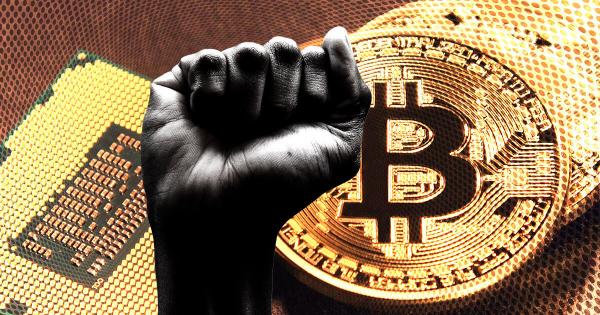STABLECOIN ISSUER TETHER TO BEGIN BITCOIN MINING OPERATIONS IN URUGUAY
Enteing the world of miners for bitcoin mining in Uruguay is a bold and strategic move that has to reshape the crypto industry.

In a groundbreaking move, Tether, one of the most prominent stablecoin issuers in the cryptocurrency Bitcoin mining market, has recently announced its entry into the world of cryptocurrency mining. Specifically, Tether is set to commence Bitcoin mining operations in Uruguay, marking a significant milestone in the crypto industry. This development has sent shockwaves through the crypto community, as it represents a strategic shift for Tether, a company primarily known for its stablecoin USDT. In this blog post, we will explore Tether's foray into Bitcoin mining, shedding light on the implications, the technology involved, and the impact on the broader crypto ecosystem.
The Rise of Cryptocurrency Bitcoin Mining
Cryptocurrency mining has emerged as a crucial component of the blockchain technology landscape. It is the process by which transactions are verified and added to the public ledger, known as the blockchain. Miners use powerful computers, known as cryptocurrency mining machines, to solve complex mathematical puzzles. Once these puzzles are solved, miners are rewarded with cryptocurrency tokens, such as Bitcoin. This process not only secures the network but also plays a pivotal role in the creation and distribution of new cryptocurrencies.
Tether's Bold Move
Tether's decision to venture into cryptocurrency mining is a significant departure from its primary role as a stablecoin issuer. Stablecoins are digital currencies that are pegged to a stable asset, such as the US dollar, to minimize price volatility. USDT, Tether's flagship stablecoin, is one of the most widely used stablecoins in the crypto market.
The move into cryptocurrency mining signals Tether's intent to diversify its operations and become a more integral part of the cryptocurrency ecosystem. It also underscores the company's commitment to maintaining transparency and backing its stablecoins with tangible assets. By engaging in Bitcoin mining, Tether aims to generate revenue streams and strengthen its reserves.
Setting Up Shop in Uruguay
Uruguay, a small South American country, might seem like an unconventional choice for cryptocurrency mining machine operations. However, there are several compelling reasons behind Tether's decision to establish its mining facilities there.
- Renewable Energy: Uruguay is renowned for its commitment to renewable energy sources, primarily wind and solar power. This makes it an environmentally friendly choice for cryptocurrency mining, as the energy-intensive process can have a significant carbon footprint.
- Political Stability: Uruguay boasts a stable political environment, which is crucial for long-term investments in the cryptocurrency industry. Political stability reduces the risk of regulatory upheavals that can impact mining operations.
- Access to Talent: The country has a growing tech sector and a well-educated workforce, making it an attractive location for setting up crypto mining facilities.
- Geographic Advantages: Uruguay's geographical location, close to the Southern Hemisphere, offers unique advantages for cooling mining equipment, thereby increasing operational efficiency.
Technology at the Core
To understand Tether's move into cryptocurrency mining, it's essential to delve into the technology that drives this industry.
- Cryptocurrency Mining Machines: At the heart of any mining operation are the bitcoins mining app. These machines, also known as mining rigs, are specialized computers designed to solve the complex mathematical algorithms required for mining. Tether's choice of mining equipment will play a crucial role in the success of its operations.
- Crypto Mining Software: To operate mining machines efficiently, crypto mining software is essential. These software programs connect mining rigs to the blockchain network and manage the mining process. Choosing the right software is pivotal for maximizing mining output.
- Crypto Mining Sites: The physical locations where mining rigs are set up are known as mining sites or farms. These sites require robust infrastructure, including cooling systems to prevent overheating, and access to a stable power supply.
- Crypto Mining Calculator: Before embarking on a mining venture, it's crucial to assess its profitability. Crypto mining calculators help miners estimate their potential earnings based on factors like electricity costs, mining hardware, and the current cryptocurrency market conditions.
- Bitcoins Mining App: Some miners opt for mobile apps that allow them to monitor and control their mining rigs remotely. These apps provide real-time updates on mining performance and earnings.
- Cryptocoin Mining Rig: A mining rig is a collection of interconnected mining machines working together. Tether's mining rigs will likely consist of a multitude of machines working in unison to increase mining efficiency.
Impact on the Crypto Ecosystem
Tether's entry into Bitcoin mining has far-reaching implications for the crypto mining apps ecosystem.
- Enhanced Security: As Tether actively participates in Bitcoin mining, it contributes to the security and decentralization of the Bitcoin network. Increased miner participation strengthens the network against potential attacks.
- Stablecoin Backing: Tether's mining operations could provide an additional layer of security for its stablecoins. By generating revenue from mining, Tether can further back its stablecoins with real-world assets, bolstering user trust.
- Market Competition: Tether's move into mining adds to the competitive landscape of cryptocurrency mining. This increased competition may lead to technological advancements and cost efficiencies in the mining industry.
- Geographic Diversification: Tether's choice of Uruguay as a mining location demonstrates the importance of geographic diversification in the crypto industry. It sets a precedent for other companies looking to establish mining operations in favorable locations.
- Regulatory Scrutiny: Tether's expanded role in the crypto ecosystem may subject the company to increased regulatory scrutiny. Governments and regulatory bodies are likely to closely monitor the activities of influential players like Tether.
Tether's decision to enter the world of miners for crypto in Uruguay is a bold and strategic move that has the potential to reshape the crypto industry. By actively participating in Bitcoin mining, Tether aims to diversify its operations, enhance the security of the Bitcoin network, and strengthen the backing of its stablecoins. The technology behind cryptocurrency mining, including mining machines, software, and mining sites, will play a pivotal role in the success of Tether's mining operations.
As Tether sets the stage for its mining venture, the crypto community eagerly watches the developments. This move underscores the dynamic and ever-evolving nature of the cryptocurrency industry, where companies adapt and innovate to secure their positions in the digital economy.
What's Your Reaction?
















